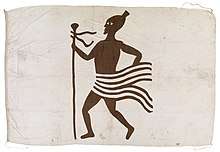William Henry Wylde (civil servant)
William Henry Wylde (1819–1909) was a British civil servant of the Foreign Office, where he was head of the Commercial, Consular, and Slave Trade Departments.[1][2]
Life
He was the son of William Wylde.[1] His father was British Commissioner in Spain during the First Carlist War, and Wylde was there as his secretary in 1836.[3] In 1846–7 his father was sent to the Patuleia in Portugal, and Wylde accompanied him, with also his brother Robert Gervas Wylde.[1]\
Joining the Foreign Office in 1839, Wylde's initial grade was supernumerary clerk; he was promoted to assistant clerk in 1859. He was head of the Commercial and Consular Department from 1865, retiring in 1880.[4]

Wylde was created C.M.G. in 1880.[5] In 1884 he read part of the 1883 diary of Henry Edward O'Neill, consul in Mozambique, to the Royal Geographical Society, of which he had become a Fellow in 1863.[6][7]
Views
Wylde was a member of the Anti-Slavery Society.[8] He gave evidence to the parliamentary committee on West Africa in 1865.[9] In 1873 he pressed for the continuation of payments to Masaba of the Bida Emirate, as positive for British trade prospects in the area. He was a proponent for the view that the British had duties in West Africa, against those for retrenchment and a reduction of commitments.[10]
As head the slave trading department of the Foreign Office, Wylde argued against making a treaty with the Ottoman Empire to allow the Royal Navy to search Ottoman vessels for enslaved people, on the grounds that in these cases distinguishing them from other passengers was difficult.[11] In the early 1870s he considered that the extent of the British consular presence in the Levant was justified in terms of keeping the peace there.[12]
Family
Wylde married in 1846 Elizabeth Mary Massy, daughter of Richard Massy.[13] They had four sons and three daughters.[3] The sons included Augustus Blandy Wylde (1849–1909), African traveller and agent for the Sudan Trading Company.[14][15]
The eldest daughter, Wilhelmina Elizabeth, married Joseph Maghull Yates in 1873, and was mother of Humphrey Yates.[16][17] The second daughter Mary Ella married Charles Molesworth Tuke in 1883.[18] Everard William Wylde (1847–1911), the eldest son, married in 1872 Florence Evans, daughter of the Rev. Lewis Evans of Sandbach.[19]
Notes
- "Wylde Family Papers - Archives Hub". archiveshub.jisc.ac.uk.
- Serels, Steven (2013). Starvation and the State: Famine, Slavery, and Power in Sudan, 1883–1956. Springer. p. 86. ISBN 9781137383877.
- Addison, Henry Robert; Oakes, Charles Henry; Lawson, William John; Sladen, Douglas Brooke Wheelton (1909). Who's who. A. & C. Black. p. 2096.
- McIntyre, W. David (1967). Imperial Frontier in the Tropics. Springer. p. 102 and note 1. ISBN 9781349003495.
- Fox-Davies, Arthur Charles (1895). Armorial Families: A Complete Peerage, Baronetage, and Knightage, and a Directory of Some Gentlemen of Coat-armour, and Being the First Attempt to Show which Arms in Use at the Moment are Borne by Legal Authority. Jack. p. 1063.
- Dorothy O. Helly, "Informed" Opinion on Tropical Africa in Great Britain 1860–1890, African Affairs Vol. 68, No. 272 (Jul., 1969), pp. 195–217 at p. 213. Published by: Oxford University Press on behalf of The Royal African Society. JSTOR 720328
- "Catalogue of the Wylde Family Papers". reed.dur.ac.uk.
- Dorothy O. Helly, "Informed" Opinion on Tropical Africa in Great Britain 1860–1890, African Affairs Vol. 68, No. 272 (Jul., 1969), pp. 195–217 at p. 202. Published by: Oxford University Press on behalf of The Royal African Society. JSTOR 720328
- Dorothy O. Helly, "Informed" Opinion on Tropical Africa in Great Britain 1860–1890, African Affairs Vol. 68, No. 272 (Jul., 1969), pp. 195–217 at p. 214. Published by: Oxford University Press on behalf of The Royal African Society. JSTOR 720328
- McIntyre, W. David (1967). Imperial Frontier in the Tropics. Springer. p. 102. ISBN 9781349003495.
- Alison Frank, The Children of the Desert and the Laws of the Sea: Austria, Great Britain, the Ottoman Empire, and the Mediterranean Slave Trade in the Nineteenth Century, The American Historical Review Vol. 117, No. 2 (April 2012), pp. 410–444 at p. 433. Published by: Oxford University Press on behalf of the American Historical Association JSTOR 23310742
- Gordon L. Iseminger, The Old Turkish Hands: The British Levantine Consuls, 1856–1876, Middle East Journal Vol. 22, No. 3 (Summer, 1968), pp. 297–316 at p. 310. Published by: Middle East Institute JSTOR 4324298
- Burke, Bernard (1903). Ashworth P. Burke (ed.). A Genealogical and Heraldic Dictionary of the Peerage and Baronetage, the Privy Council, Knightage and Companionage (65th ed.). London: Harrison and Sons. p. 1960.
- Uhlig, Siegbert (2010). Encyclopaedia Aethiopica: O-X. Isd. p. 1197. ISBN 9783447062466.
- Serels, Steven (2013). Starvation and the State: Famine, Slavery, and Power in Sudan, 1883–1956. Springer. p. 86. ISBN 9781137383877.
- "Yates, Joseph Maghull (YTS863JM)". A Cambridge Alumni Database. University of Cambridge.
- Bailey, Philip; Thorn, Philip; Wynne-Thomas, Peter (1984). Who's Who of Cricketers. London: Newnes Books. p. 1140. ISBN 0600346927.
- "The Medical Times and Gazette". Internet Archive. 27 January 1883. p. 112. Retrieved 27 October 2018.
- The Pall Mall Budget: Being a Weekly Collection of Articles Printed in the Pall Mall Gazette from Day to Day, with a Summary of News. 1872. p. 38.